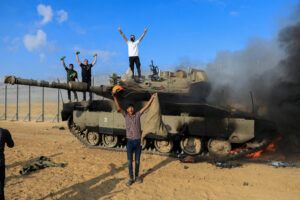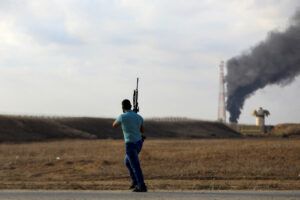Reuters photography staff won the Pulitzer Prize on Monday (May 6) in Breaking News Photography for “raw and urgent photographs documenting the October 7th deadly attack in Israel by Hamas and the first weeks of Israel’s devastating assault on Gaza.”
Appallingly, one of the photos in the agency’s winning 15-image compilation was taken inside Gaza by Yasser Qudih, a photojournalist who had infiltrated Israel on October 7, as HonestReporting exposed last November.
It’s noteworthy, however, that none of his images taken from inside Israel on that horrific day were included in Reuters’ winning portfolio.
It’s appalling that one of the Gazan photojournalists who infiltrated Israel on October 7 is now a @PulitzerPrizes recipient. It’s noteworthy, however, that none of his images taken from inside Israel on that horrific day were included in @Reuters‘ winning portfolio.
We hope… https://t.co/PxG5X4aSb5
— HonestReporting (@HonestReporting) May 7, 2024
While Qudih’s winning image shows a typical war scene of Palestinians fleeing a bomb site in Gaza, his border photos from October 7 are quite different.
Qudih was at the scene early enough that morning to capture an image of a still-smoldering Israeli tank after he had illegally crossed into the Jewish state.

Another of Qudih’s photos from that day shows a Palestinian gunman on the Israeli side of the border.

Related Reading: Broken Borders: AP & Reuters Pictures of Hamas Atrocities Raise Ethical Questions
Reuters said Qudih had no prior knowledge of the attack and that the agency didn’t embed photographers with Hamas.
But the fact Qudih could freely capture gunmen without being threatened suggests that, at a minimum, he had their tacit approval to document and disseminate their actions.
As revealed two months ago by Israel’s Channel 12 news magazine Uvda, the documentation and distribution of the October 7 atrocities was part of Hamas’ vicious plan.
Did Reuters have no qualms about including in its Pulitzer nomination, someone whose professional and ethical conduct had been called into question?
And didn’t the Pulitzer Board conduct background checks on the recipients of a top journalism prize?
Probably not, considering the board also granted a special citation to “the courageous work” of journalists covering the war under fire in Gaza, ignoring the fact that some of them had been moonlighting for Hamas and Islamic Jihad.
It is telling, however, that Reuters’ winning portfolio didn’t include any of Qudih’s problematic border images, nor any taken by his colleague, Mohammed Fayq Abu Mostafa.
The latter’s photo of a lynched Israeli soldier being dragged out of the tank had previously been featured by Reuters in its photo galleries throughout the war.
Therefore, while we deplore the inclusion of Qudih in the winning Pulitzer portfolio, the absence of tainted border images would indicate some sort of self-reflection by Reuters. If images that were previously deemed by Reuters to be among its top photos of the year are no longer considered to be worthy of submission for awards, this represents a positive development.
It can only be hoped that Reuters recognizes that the photos it published by Gazan photojournalists who accompanied Hamas across the border are ethically flawed and should not be rewarded with a Pulitzer or any other industry honor.
Liked this article? Follow HonestReporting on Twitter, Facebook, Instagram and TikTok to see even more posts and videos debunking news bias and smears, as well as other content explaining what’s really going on in Israel and the region. Get updates direct to your phone. Join our WhatsApp and Telegram channels!

